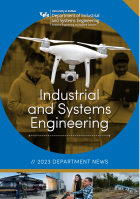Sudit receives $1,000,000 grant from Office of Naval Research
Published August 7, 2020
A team led by Moises Sudit received a $1,000,000 grant from the Office of Naval Research to help decision-makers make decisions in real-time, based on complex scenarios that can quickly grow exponentiallly.
Decision-making in the battlefield is based on a huge amount of information that needs to be fused to create not only current situational awareness, but also project the impact to blue forces as well as the potential changes in behavior of red forces.

Moises Sudit
One way to accomplish a set of courses-of-action that will maximize success and satisfy mission objectives is to run a simulation to understand the different potential outcomes and generate probabilities of success based on possible actions. The difficulty of such an approach in the middle of a mission is that many simulations need to be run in an environment that is constantly changing and attaining acceptable confident intervals is often impractical or not timely.
It is important to note that simulations are critical to generate enough heterogeneous scenarios and datasets for training; however, there is the need for an alternative to be able to decide the best course of action when time is of the essence.
Game theory and a number of computerized games (i.e., Chess, StarCraft) are played with well-known moves given certain situational awareness of the current state of the game. This project aims to provide “set plays” (i.e., alternative decision tracks) that are consistent with doctrine.
It will also allow decision-makers to ask “what-if” questions that will have matched previously analyzed situations for which simulation validation has produced a priori results with statistically acceptable confidence. Furthermore, if a decision-maker wants to validate doctrine, the user could ask the system to “play the game” without any hard constraints.
Entitled Managing Exponential Decision Spaces, the project will assist commanders and decision makers through a variety of analysis and modeling techniques that automate the evaluation of options to take at any given state while presenting the best alternatives in a clear and concise manner for final approval.
The key aspect of this research is to manage a decision-space that could grow exponentially. Therefore, the main technical challenge is to balance a scalable decision tree against maintaining the most plausible/impactful Course of Actions (COAs) and Enemy Course of Action (ECOAs) over the life of the mission.
The University at Buffalo is the prime contractor of the three-year project. In addition to Sudit, who is a professor and UB associate vice president for research, Rajan Batta, SUNY Distinguished Professor and associate dean for faculty affairs and diversity in the School of Engineering and Applied Sciences, and Jose Walteros, assistant professor, all from UB's Department of Industrial and Systems Engineering, are co-PIs on the project. Subcontractors are the Rochester Institute of Technology and CUBRC.
